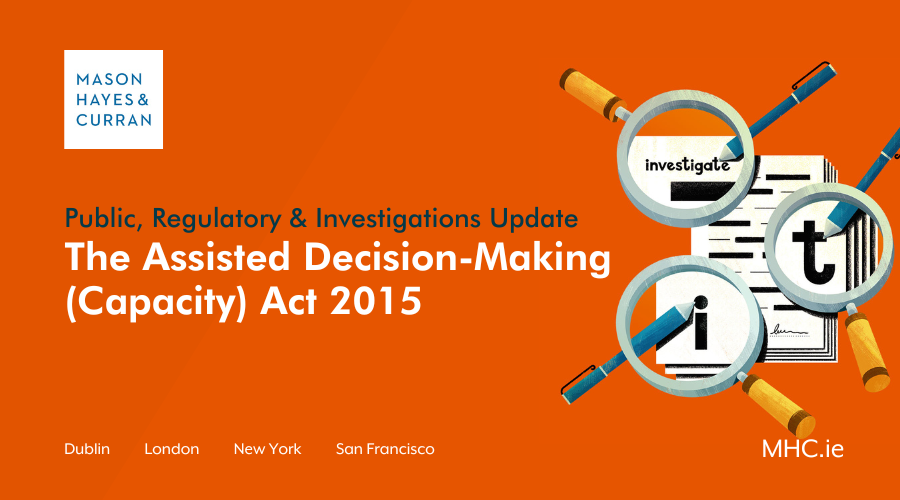The Assisted Decision-Making (Capacity) Act 2015
Tips for organisations

The Assisted Decision-Making (Capacity) Act 2015 introduces a fresh legal framework for facilitating supported decision-making. Our Public, Regulatory & Investigations team examines how this legislation will impact organisations including charities and healthcare providers and the steps they can take to ensure compliance.
The Assisted Decision-Making (Capacity) Act 2015 introduced a fresh legal framework to facilitate supported decision-making. In a previous article, we discussed an overview of the 2015 Act and the impact on healthcare providers. The 2015 Act applies to everyone and is relevant to charitable organisations whose members may have limited or no capacity to make certain decisions. Therefore, there are certain implications that these organisations must be aware of regarding the 2015 Act.
It is important to note that a person’s capacity must be assessed based:
- On their ability to understand, at the time of the decision,
- The nature and consequences of the decision to be made by them,
- In the context of the available choices at that time.
Organisations must be mindful when considering whether individuals that are members, or are under the care, of the organisation fulfil the capacity test above. It is also important to note that the 2015 Act applies to a broad range of decisions that an individual may need to make, namely:
- Decisions relating to personal welfare: this includes decisions relating to an individual’s accommodation, their education or employment, and their participation in social activities
- Decisions relating to property and affairs: this includes decisions relating to the management of an individual’s property, the buying and selling of an individual’s property and the discharge of an individual’s tax or debts.
Our three top tips for organisations
1. Consider its member base
Organisations should consider its member demographic and whether concerns regarding capacity to make and understand decisions arise. Some organisations may encounter individuals who by way of injury or disability may lack capacity to make certain decisions. It is important to understand that capacity assessment must be carried out on an individual basis and a blanket policy cannot be adopted.
2. Consider the decisions members may encounter
The 2015 Act broadly covers two categories of decisions: those relating to personal welfare and those relating to property and affairs. Organisations should consider if its members, or individuals that it interacts with, are faced with decisions in these categories, during its interaction with them. Organisations should note that capacity is considered to be decision-specific, ie an individual may lack capacity to make decisions in relation to their accommodation needs but may have the requisite capacity to make decisions about their participation in social activities. In addition, an individual who lacks capacity to make a particular decision at a point in time is not precluded from being regarded as having capacity to make that same decision at a different point in time.
3. Consider any additional supports that it may offer members
A guiding principle of the 2015 Act is that a person will not be considered as unable to make a decision regarding a matter unless all practicable steps have been taken to assist them to do so. Organisations may wish to offer alternative methods of presenting information relevant to a decision, such as simplified language or an explanatory video.
Conclusion
The 2015 Act raises a number of issues that organisations must carefully consider in relation to its members, or those under its care, and any decisions they may make.
If you have any questions about the new legislation and any other regulatory matters, please contact a member of our Public, Regulatory and Investigations team.
The content of this article is provided for information purposes only and does not constitute legal or other advice.
People also ask
What is the Assisted Decision-Making (Capacity) Act (2015)? |
The Assisted Decision-Making (Capacity) Act (2015) introduced a fresh legal framework for facilitating supported decision-making. |
How does the 2015 Act measure capacity? |
A person’s capacity shall be assessed based on his or her ability to understand, at the time that a decision is to be made, the nature and consequences of the decision to be made by him or her in the context of the available choices at that time. |
What different types of assisted decision-making to those lacking capacity are outlined under the 2015 Act? |
Under the new legislation, a person who currently requires decision support can avail of a three-tier system of assisted decision-making:
|
Share this:


